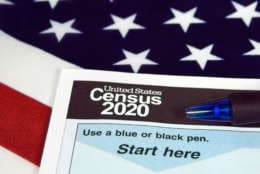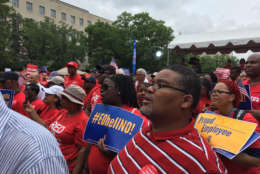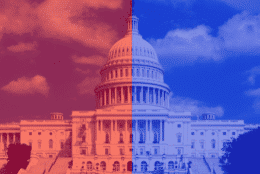Unions
-
In today's Federal Newscast, Veterans Affairs Secretary Robert Wilkie rules unions can no longer use collective bargaining rights when negotiating issues tied to professional conduct and patient care by VA providers.
August 20, 2018 -
Veterans Affairs Secretary Robert Wilkie says he'll review some personnel moves and major agency actions himself, as 16 senators urge the new secretary to review a series of actions from prior VA leadership that have impacted career employees and executives.
August 17, 2018 -
In today's Federal Newscast, the Government Publishing Offices takes another stab at finding a vendor to print and mail 2020 census forms.
August 17, 2018 -
People who say it is next to impossible to fire a federal worker should study — and then maybe rejoice in — the Hatch Act, a much-amended 1940s law designed to keep career federal and postal workers from engaging in partisan political activity on the job.
August 16, 2018 -
In today's Federal Newscast, the Office of Personnel Management is encouraging agencies to let Washington-area employees use telework and other workplace flexibilities for the next two weeks during Metro's major track work.
August 13, 2018 -
The president's recent executive orders are accelerating messy and heated collective bargaining negotiations between the Health and Human Services Department (HHS) and National Treasury Employees Union (NTEU).
August 10, 2018 -
Local American Federation of Government Employees representatives at the Veterans Affairs Department say the agency has inconsistently implemented the president's executive order on official time.
August 10, 2018 -
Are you retiring at the first opportunity? Or are you planning to work extra because you like the job or your coworkers and want to build your annuity?
August 10, 2018 -
The Federal Labor Relations Authority reportedly told the American Federation of Government Employees this week that the Education Department did bargain in "bad faith" when it ended ground rules negotiations and implemented its own management document.
July 27, 2018 -
Eric Young, national president of the American Federation of Government Employees Council of Prison Locals, said what he would like to see in the 2019 budget to resolve the issue.
July 26, 2018 -
A coalition of federal unions has sued the Trump administration over the president's recent executive orders, but attorneys representing the government say the unions' challenges fall outside of the D.C. district court's jurisdiction.
July 26, 2018 -
Ahead of oral arguments in federal district court on Wednesday, federal employee unions showed their disapproval of three recent executive orders from President Donald Trump.
July 25, 2018 -
Federal workers got a 1.4 percent raise in January that was proposed and backed by the president. But the outlook for 2019 was and still is different.
July 24, 2018 -
Back in less partisan times, federal and postal unions or at least their elected leaders leaned Democratic and but close ties with key Republicans in Congress, as well as with staffers whose committees dealt with civil service matters.
July 23, 2018 -
A House bill has been passed out of committee to give agency heads the power to restrict employee access to certain websites, including Facebook and personal emails. Rep. Gary Palmer (R-Ala.) said his bill will improve cybersecurity and cut down on information leaks.
July 20, 2018














